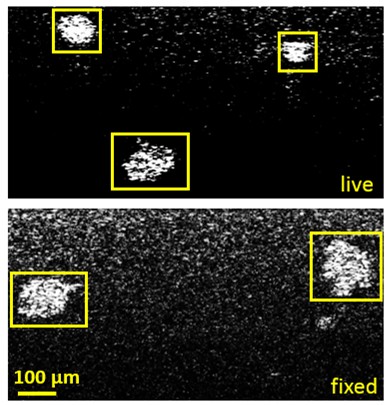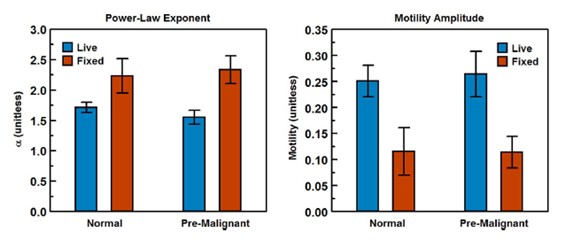

Assessing Toxicants on the Mammary Epithelial Cells to Predict Breast Cancer Risk and Drug Screening Applications: An understanding of how the mammary gland responds to toxicant exposure is critical for guiding effective breast cancer therapies. Studies of model systems, however, suffer from a lack of high-throughput toxicological assays to assess the behavior of the mammary gland as it evolves over time within its native micro-environment. As we recently reported in Yu et al,2018, we have developed a label-free optical coherence tomography (OCT)-based platform for tracking toxicant exposure-response relationships in three-dimensional (3D) mammary epithelial organoid models. We demonstrated the feasibility of OCT fluctuation spectroscopy to quantify mammary epithelial cell toxicant response non-invasively and longitudinally, and the ability to measure the response of breast cancers to potential therapies may lead to new treatment options. This technique results in a high throughput screening tool for assessing the effects of toxicants on mammary gland, and eventually reduce use of animals.
To understand the nature of the OCT data, representative movies (Fig. 1) showing the speckle fluctuations of live and fixed pre-malignant mammary epithelial cell organoids are provided. More activity can be observed in live relative to fixed cells, which is attributed to the nanoscale motion of intracellular components that scatter the near-infrared OCT light. This in-place intracellular motility is quantified by the parameters alpha and M for each organoid. The results, summarized in Fig. 2, indicate that for both cell lines, alpha and M are significantly different (p less than 0.0001) between live and fixed cells.

Fig. 1. Live and fixed pre-malignant mammary epithelial cells.

Fig. 2.Alpha and M of MEC organoids composed of normal or premalignant cell lines were quantified before and after fixation (from Oldenburg et al, 2015).
intro page - research - publications - people - open positions
UNC Physics & Astronomy - Biomedical Research Imaging Center - UNC Home